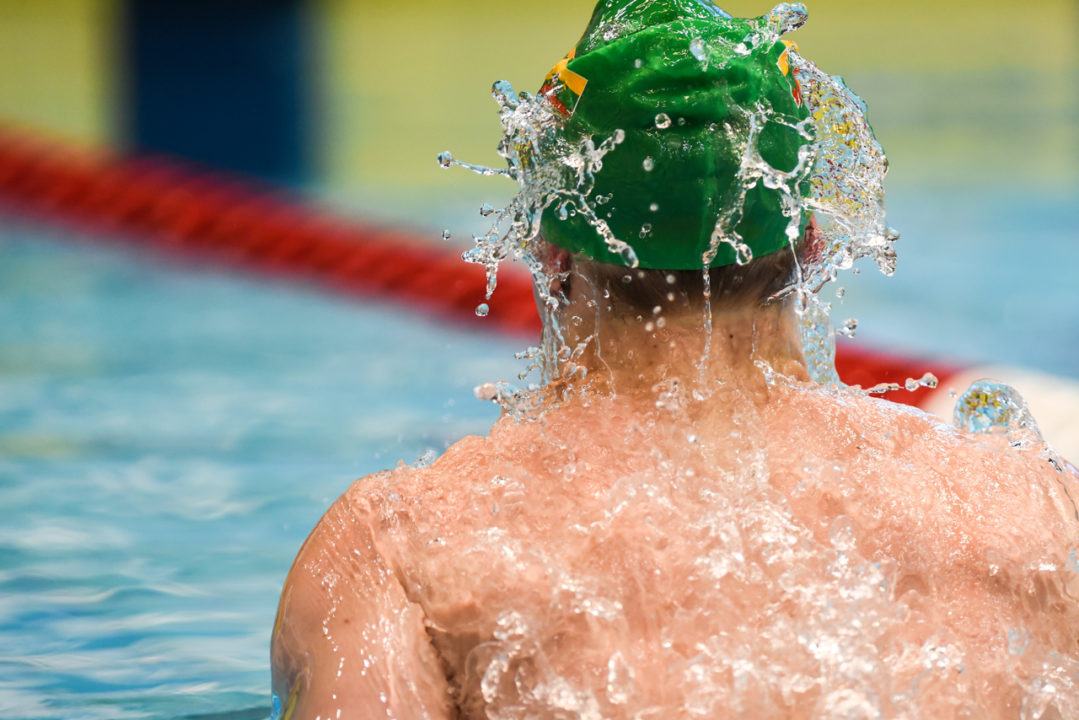Written and courtesy of Elizabeth Wickham
We learned big lessons as a family at our daughter’s conference meet—mostly that things don’t go as planned. My daughter, who got hit hard by the flu five days before the meet asked, “What other sport do you train for eight months for one single meet and then you could be hurt or sick?”
I know we’re not alone in this. I’ve heard tons of stories where swimmers get sick or hurt before their target meet. They may trip over their dog on the stairs and have knee surgery, or break a wrist skateboarding in their driveway while waiting to leave for the meet. I’ve heard about a swimmer who got a concussion during warm-up at her big meet. Our kids put in an enormous amount of work for months. Yes, they get to race at meets along the way, but it’s their big end-of-season meet where they reap rewards for their months of hard work.
Here are four things we learned from the experience:
ONE
Some things are out of our control.
Whether it’s getting sick, injured or discovering the times got a whole lot faster—and there are faster swimmers in the pool—what can you do about it? It’s not in our control. We can accept the situation for what it is.
TWO
We can control our attitude.
When our children have tried their hardest, of course they’ll be upset when things don’t work out. Their hard work may pay off at a later date. An injury or illness can be a disappointment for all of us, but it’s not the end of the world. If we stay positive it will help them, too. Being part of a team and cheering for their teammates will help them keep a positive outlook and attitude.
THREE
It’s a learning experience.
Life throws us curves and never works in a straight line. Our kids are well-served to experience disappointments at a swim meet. These lessons can transfer into their lives when they study hard for a test and get a bad grade or don’t get a promotion they deserve.
FOUR
Trust the coach.
In my daughter’s case, her coaches made a plan and she bought into it. They scratched some events, kept her in bed and focused on her best event—and they communicated the plan to us. As parents, we could have second-guessed whether she should swim, or why she scratched. Yes, I’m the mom, but I’m not a coach. If we had questioned the coaches’ decision, it might have affected our daughter’s trust and confidence.
What has gone wrong at your children’s biggest meets and what lessons have you learned?
Elizabeth Wickham volunteered for 14 years on her kids’ club team as  board member, fundraiser, newsletter editor and “Mrs. meet manager.” She’s a writer with a bachelor of arts degree in editorial journalism from the University of Washington with a long career in public relations, marketing and advertising. Her stories have appeared in newspapers and magazines including the Los Angeles Times, Orange County Parenting and Ladybug. You can read more parenting tips on her blog: http://bleuwater.me/.
board member, fundraiser, newsletter editor and “Mrs. meet manager.” She’s a writer with a bachelor of arts degree in editorial journalism from the University of Washington with a long career in public relations, marketing and advertising. Her stories have appeared in newspapers and magazines including the Los Angeles Times, Orange County Parenting and Ladybug. You can read more parenting tips on her blog: http://bleuwater.me/.

Our 11 year old daughter swam in YsCaps here in Central PA on Saturday and Sunday. She had the norovirus all week and missed most of practice and school last week. She didn’t have a good meet on Saturday but made the finals on Sunday and dropped time. But it wasn’t pretty. Do you want dropped times or do you want pretty…I don’t know. She had a tough time because her BFF on the team continues to drop 3 seconds/event in the same events she swims. Our 11 year old is no longer dropping time like that this season. #2 was talked about quite a bit this week and I think gentle reminders like this are good for us so… Read more »
Thanks. Our daughter got the flu right before her very first conference championship. I was so torn as her mother, but her coach and she worked out a plan. She rested, was scratched and swam her best events. Surprisingly she did well. It was hard but I trusted her and she trusted her coach.
Glad to know my child isn’t the only one who seems to fall ill at a critical time!
Very timely, as my HS swimmer is rehabbing a shoulder injury right now and will miss Sectionals, for which she qualified in eight(!) events this season…she’s devastated, and it’s been tough for me and her club and HS coach to convince her that the orthopedist and physical therapist are doing what’s best for her, long term, by resting the joint and easing back in gradually so that she can finish the HS season and hopefully again go to CIF finals. It’s so very hard to communicate with a driven, motivated not-fully-developed teenage brain that needs more impulse control and “big picture” outlook! Thanks for another good article, Elizabeth.